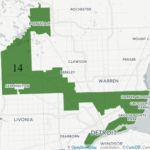After weeks of speculation that the 5-2 Republican majority on the state Supreme Court would block Michigan’s anti-gerrymandering ballot proposal, Tuesday’s strongly worded majority opinion in favor of placing the proposal on the November ballot was written by GOP Justice David Viviano.
The 4-3 decision issued late last night will surely spark some Republican Party backlash, but Macomb County voters who are quite familiar with the Viviano family should not be surprised with the verdict. David Viviano (above), former chief judge of the Macomb County Circuit Court, comes from a patriarchy that has held a prominent place in Macomb County politics and legal circles for decades.
Viviano’s father, Antonio Viviano, was a veteran in the Macomb County Probate and Circuit courts while his sister, Kathryn Viviano, has served for several years in Macomb’s Family Court and Juvenile Drug Court.
At issue on Tuesday was a petition drive that sparked the Voters Not Politicians (VNP) proposal to put the redistricting process into the hands of a nonpartisan citizens commission. While GOP loyalists viewed the court fight over the ballot proposal as a partisan duty to continue engaging in hardball tactics and block redistricting reform, Justice Viviano took the high ground.
“We are stewards of the people and must faithfully abide by the decision they make through the laws they adopt,” Viviano wrote.
“We accomplish this by adhering to the plain meaning of the text of those laws. Here that approach leads us to conclude that a voter-initiated amendment… is permissible if it does not significantly alter or abolish the form or structure of our government, making it tantamount to creating a new constitution. VNP’s proposal surpasses these hurdles and is a permissible voter initiated amendment.”
Viviano was joined in the majority by fellow Republican Justice Elizabeth Clement and Democratic justices Richard Bernstein and Bridget Mary McCormack. In opposition were Republicans Kurtis Wilder, Brian Zahra and Chief Justice Stephen Markman.
Bridge Magazine published a package of stories today about the proposal and the impact of the court ruling, including a link to the full text of Viviano’s opinion.
Just hours before the decision came down, Bridge had reported that the potential partisan politics surrounding the ruling might be more significant than previously anticipated.
The newest revelation was that Mary Doster, a leading figure in the political fight to bounce the proposal off the ballot, had ties to all five Republican justices. A GOP insider, Doster serves as treasurer of the nonprofit Michigan Redistricting Resource Institute. That group is tied to the Michigan Chamber of Commerce, which paid nearly $1 million to GOP consultants and lawyers in 2011 and 2012 to draw political districts that favor Republicans, according to IRS records obtained by Bridge.
Doster is listed, or has served, as campaign treasurer or designated record keeper for all five GOP justices’ campaign committees.
In the end, those conflicts-of-interest did not prevail. But another aspect of this story is quite revealing. Political activists know the back story about Katie Fahey, 28, the neophyte who launched the VNP petition drive with a single Facebook post.

Fahey
The end result was an unprecedented all-volunteer group that collected 425,000 petition signatures after holding town hall meetings across the state.
When Fahey was alerted by Bridge this week about the shadowy links between Doster and the justices who were about to rule on the case, she did not engage in the usual, combative political attacks. After enduring months of ugly criticism from the GOP in her quest for a statewide vote on the VNP plan, Fahey still tries to stay above the fray in this monumental fight that could dramatically affect Michigan politics.
In fact, when told that all five GOP justices had ties to the opposition, she allowed a bit of naivete to shine through.
“Wow. That breaks my heart a little bit,” Fahey said.
“It grows harder to believe that people can remain impartial.”









